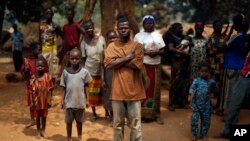It's been more two years since Therese Waima fled for her life with her five children after Muslim rebels shot her husband to death. While adjusted to a new normal inside a sprawling camp home to thousands of others, she still dreams of going home.
Yet even as she cast a ballot this past week in Central African Republic's historic presidential runoff vote, she knows it is still too dangerous to return to her village, where she wants to resume selling peanuts and manioc to support her family.
"I hope to leave one day, but we can't right now so long as there is still insecurity," she says as she washes laundry in a plastic bucket outside the thatched hut where her family stays with thousands of other Christians in the town of Kaga-Bandoro.
Sunday's election, even with its problems, marked a rare success in a country where more leaders have come to power through coups than through elections since independence from France in 1960. Though there was no major violence, many here in this town 330 kilometers (200 miles) north of the capital, Bangui, know the guns haven't disappeared altogether.
"We ask the new president to make disarmament his first priority," said Fidel Magonda, 48, as he collected cornmeal and split peas at a food distribution organized by the U.N. World Food Program and its local partners this week.
The church pastor has spent the past two years at a displacement camp with his wife and seven children in Kaga-Bandoro after Seleka fighters burned their home to the ground. And his concerns underscore the challenges that will face whoever ultimately wins the presidency: simmering tensions in the north, and hundreds of thousands of people displaced not only inside the country but living in camps in neighboring Chad, Cameroon and Congo.
The north of Central African Republic has long been a fief of Muslim rebel groups, each with its own four-letter French acronym. In 2013, several of them joined together as Seleka, the word for alliance in the local Sango language. They ultimately overthrew the president of a decade but their leader was forced to step aside after rebels committed scores of atrocities against Christian civilians during their brutal reign in power.
By late 2013, a largely Christian militia known as the anti-Balaka had arisen in opposition to Seleka forces, carrying out brutal attacks on Muslim civilians. The conflict has displaced nearly 1 million people _ about half internally including those who have fled to Kaga-Bandoro from surrounding villages in the countryside.
"There needs to be a base level of security," said Lewis Mudge, a researcher with Human Rights Watch. "People need to have the security and the confidence to start to regain their lives. And most people that I am speaking to know that is not going to come simply with an election. The elections are not going to be the silver bullet that everyone wants them to be.''
Hundreds of Seleka fighters regrouped here in Kaga-Bandoro along with Muslim civilians after fleeing the capital two years ago. Many ex-Seleka have reformed into a new group known by its French acronym, FRPC, or Popular Front for the Rebirth of Central African Republic, under the leadership of a former top Seleka official named Noureddine Adam.
Adam is believed to be in neighboring Chad despite being on a U.N. sanctions list that includes a travel ban and a freeze on his assets. These days his followers here are more likely to wear jeans and sandals than military gear.
His followers say they want to live in peace with Christians and the refugees should feel safe going home. But he says his men are tired of the country's north being marginalized by the government in Bangui, a complaint that has fueled rebellions long before the Seleka overthrow of the government.
Moussa Aboua Maoloud Baret, a local leader of the FRPC, says he sees little difference between the two candidates, both Christians, both former prime ministers who served under governments that didn't address the problems of the north.
"We are awaiting the results of this election that was imposed by the international community,'' he says. "We have no problems with the Christians, there are plenty of churches here and none have been destroyed. But we don't want to be marginalized. That is the problem.''




